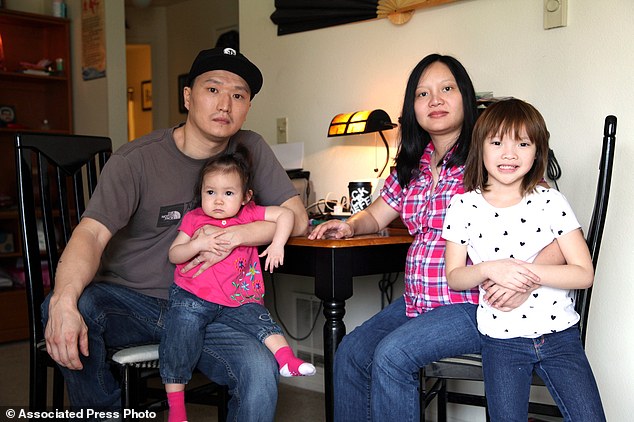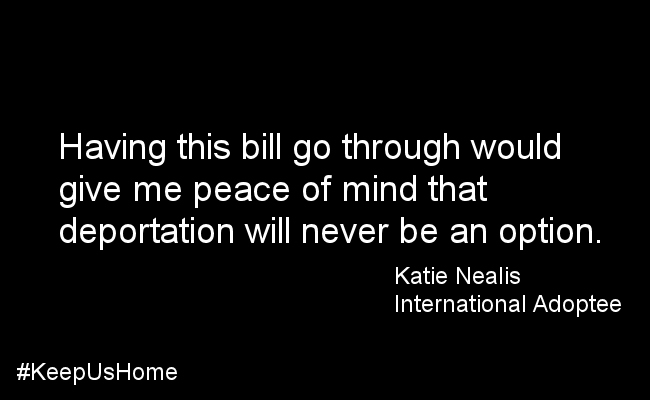
I first posted about this story back in March 2015, when the AAPI community first began organizing on behalf of Adam Crapser and all adult intercountry adoptees, many of whom are Asian.
Crapser, now 41, was adopted from Korea at the age of 3, but quickly became the victim of physical abuse, sexual abuse and abandonment by numerous foster families. The most severe abuse came at the hands of Thomas Francis and Dolly-Jean Crapser, who were eventually charged with criminal charges of abuse, sexual assault, and neglect; the pair pled guilty and served prison time for their abuse of numerous foster children including Crapser.
As might be expected, Crapser emerged from his childhood bearing numerous scars from his childhood traumas. As a younger man, Crapser had several run-ins with the law, including a guilty plea of breaking-and-entering after he broke a window after he was kicked out by his abusive foster parents; Crapser was trying to re-enter the Crapser’s family home to retrieve his meager possessions.
Nearly forty years later, Crapser has made an effort to turn his life around. Yet, with a recent immigration judge’s ruling to deny him deportation relief, Adam Crapser now faces deportation to a country he has never known.
Adam Crapser is one of nearly 35,000 intercountry adoptees in America vulnerable to deportation; most of them were adopted from Asian countries such as South Korea which alone accounts for nearly one-third of intercountry adoptees in the US.
Prior to 2000, children adopted overseas and brought into the country by American citizen adoptive parents did not receive automatic US citizenshi. Instead, those children relied upon their parents or their adoption agency to file additional naturalization paperwork on their behalf. Sadly, whether through malice or oversight, tens of thousands of adoptees did not receive naturalization as children. By the time they grew up, most of these adoptees found themselves one of the millions of undocumented immigrants — including the 1.3 million undocumented immigrants from Asia — living in America without citizenship. These adult intercountry adoptees. like any undocumented immigrant, are unable to go to school or work.
In 2000, adoptee advocates helped pass the Child Citizenship Act which corrected the problem for new intercountry adoptees. With the Act’s passage, new intercountry adoptees received automatic US citizenship. However, the Child Citizenship Act failed to provide a grandfather clause to address the thousands of adoptees like Adam Crapser who had already grown up in the United States without citizenship, and who were already adults by 2000.
For adoptees like Crapser, attempts to correct the legal problem can make matters worse. After finally receiving the required adoption paperwork from Thomas Crapser, he began the process to apply for his US green card. This triggered an automatic background check which pulled up Crapser’s decades-old criminal charges, which US Immigration typically views as a potential basis for deportation. Crapser was not only denied his permanent residency application, but deportation proceedings were initiated against him. (The Obama Administration, by the way, has set records for its deportation of more people than any other president’s administration, many of them simply for lacking legal status and for non-violent offenses.)
Last year, I interviewed Katie Nealis, who is a Korean American adult adoptee who also filed for citizenship in America as an adult. She told me:
I already consider myself an American and have as long as I can remember. It was a blow to find out I wasn’t a citizen. I know this tears up my parents to know that they forgot this important step in my life.
Unfortunately, the cost of going through the process is my own and frankly, I haven’t had the means.
So, I lived in hiding at the advice of an immigration lawyer who told me that to come forward would be inviting scrutiny. All the years I had acted as citizens do — claiming citizenship on forms and voting — could very well get me deported. I’m sure there are many that probably would call me a criminal and until this loophole is fixed I guess they would be correct.
For the last several years, AAPI and adoptee advocates have joined forces to try and stop Crapser’s deportation. They have also worked to pass an amendment to the Child Citizenship Act of 2000 that would extend the legislation to include adult adoptees. Sponsored by Senator Amy Klobuchar (D-MN), Senate Bill 2275 — the Adoptee Citizenship Act of 2015 — was introduced before the Senate last November.
Since that time, there has been no movement on the legislation.
With the news this week of Crapser’s pending deportation, there is new momentum behind Crapser’s fight, and the fight by adoptee advocates to protect all intercountry adoptees from deportation. This past week, mainstream news outlets including NPR, NBC News, the Washington Post and the New York Times among others have finally written about Crapser’s story; some for the first time since Crapser’s immigration journey began. My older posts on Adam Crapser are once again going viral.
I can only hope that this renewed attention translates into renewed energy directed towards the fight to stop the deportation of intercountry adoptees.
Crapser has been held in an ICE detention facility for nearly a year, hoping that the immigration judge would rule in his favor and grant him relief from deportation. He waived his right to appeal prior to receiving the ruling, and will now be deported as soon as logistical arrangements are made. Reports NBC of Crapser’s reaction to the ruling:
“While I am disappointed in the judge’s ruling and worried about my family’s future, I hope that what has happened to me will further demonstrate the importance of passing the Adoptee Citizenship Act,” Crapser said in a statement.
Please contact your senator now to ask them to pass the Adult Citizenship Act of 2015 and to tell them you hope that no other adoptees face deportation as Crapser has. You can also send an e-card and donate to the Adoptee Rights Campaign.

